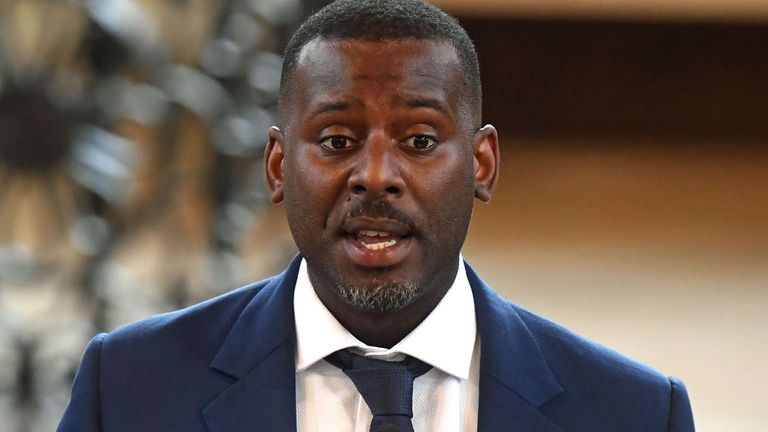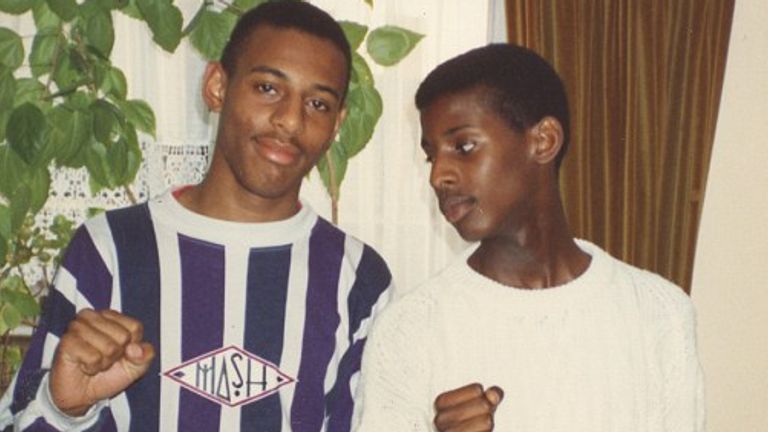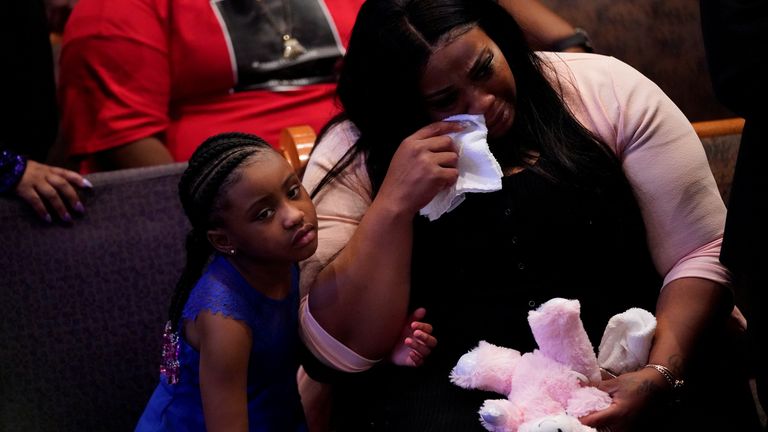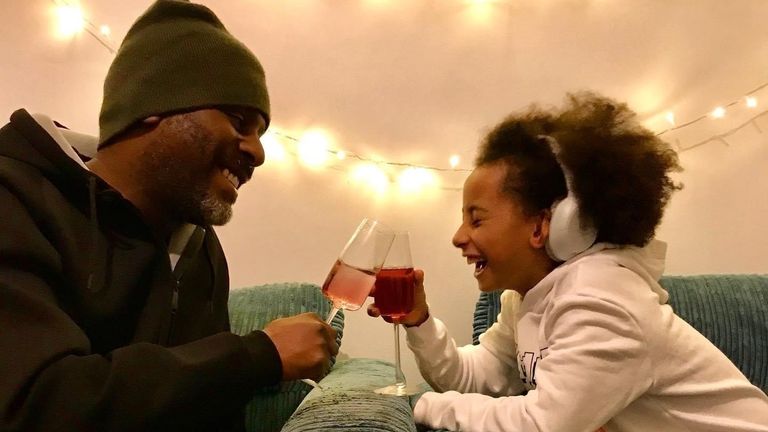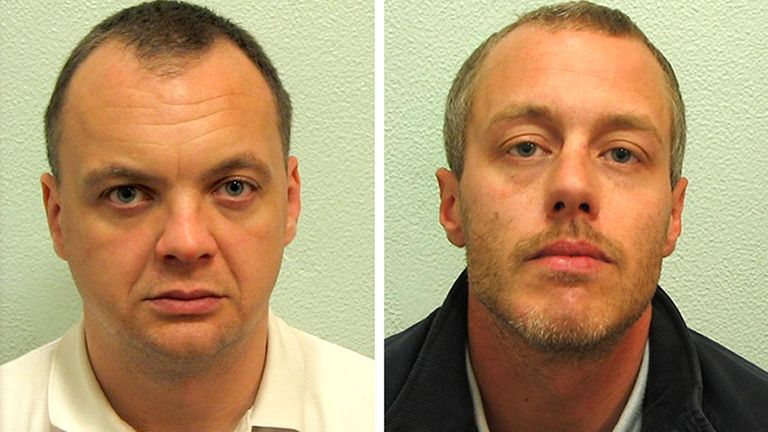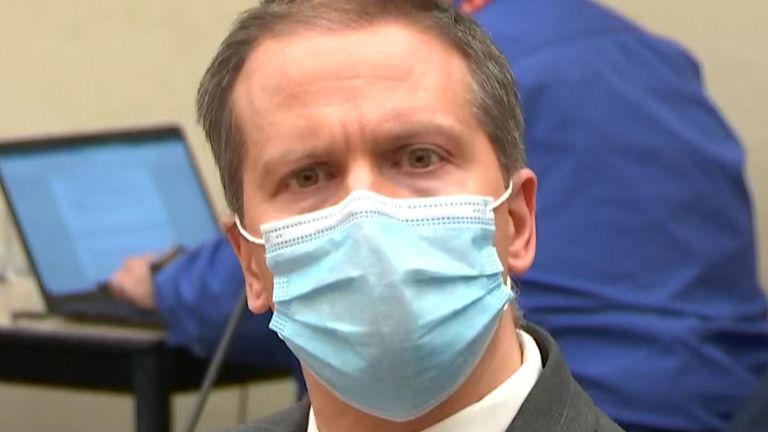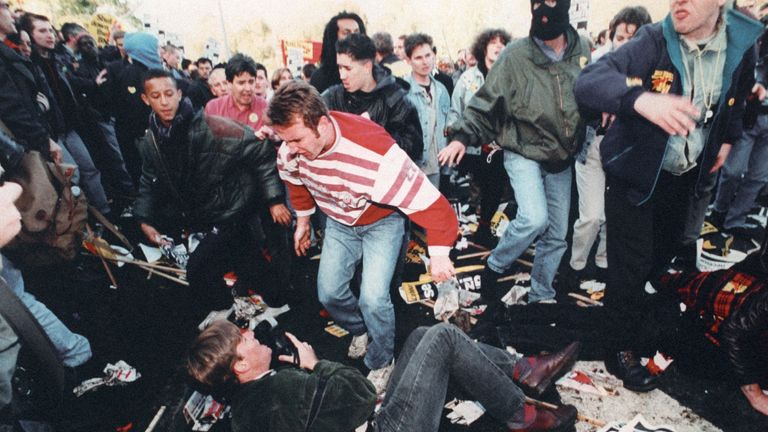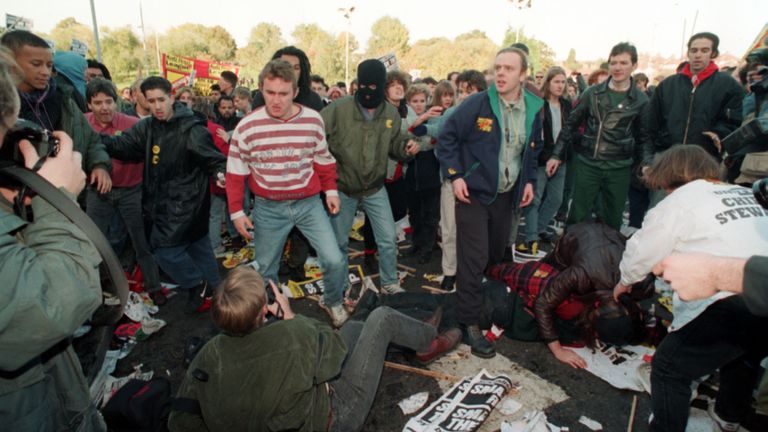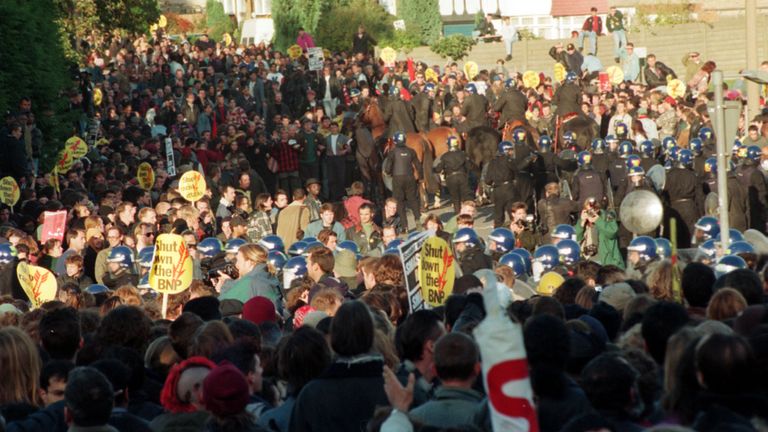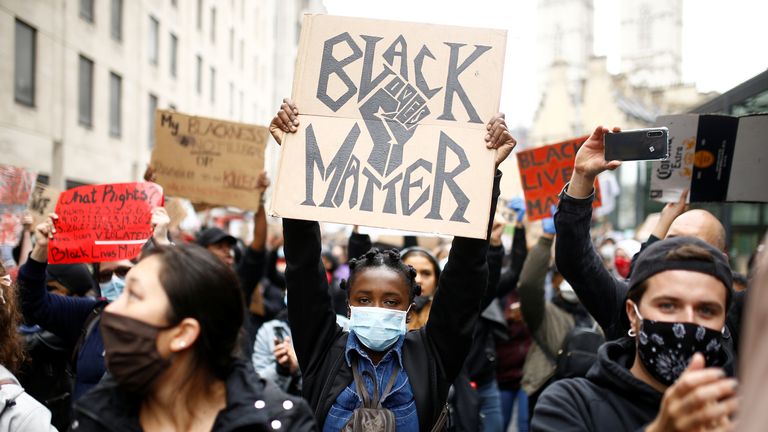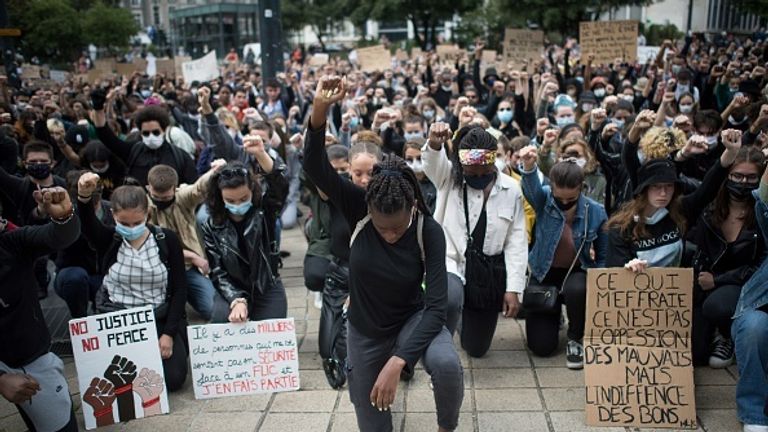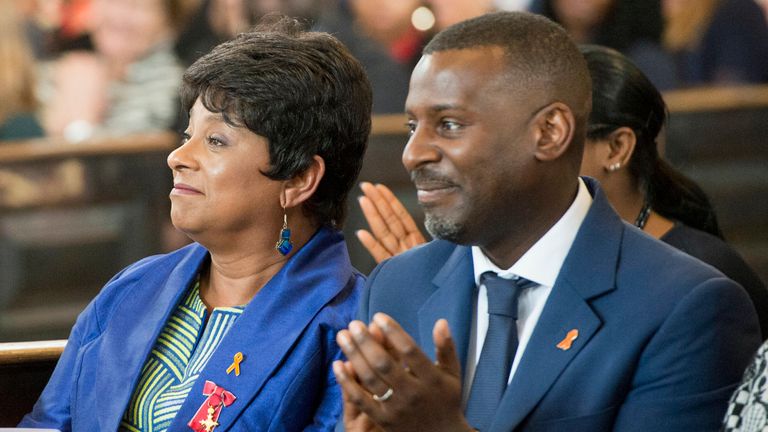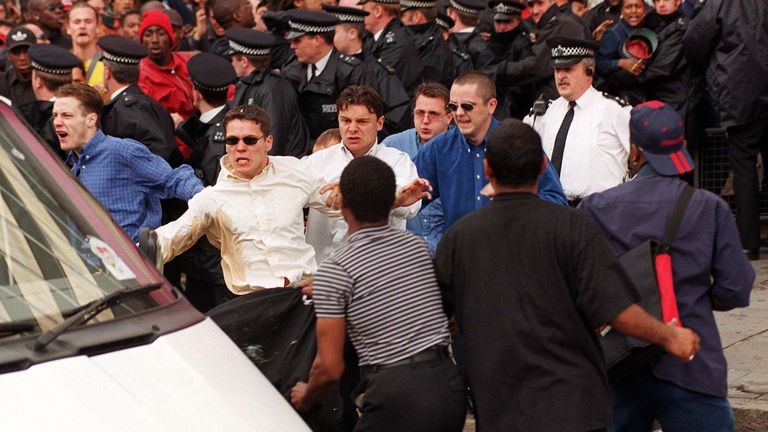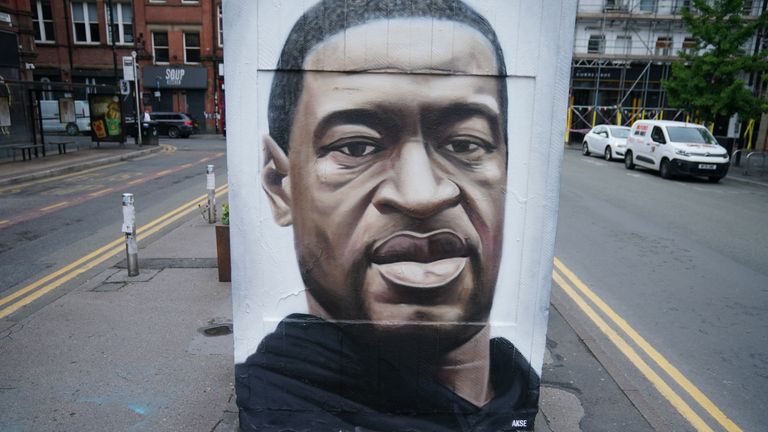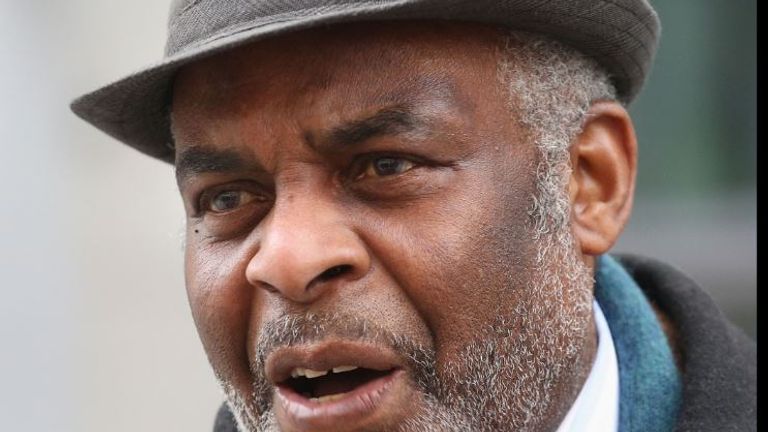‘They’re going to have dark days’: Stephen Lawrence’s brother warns of ‘pain’ ahead for George Floyd’s family
Stuart Lawrence was watching television with his wife and young son when he first saw the murder of George Floyd.
The family had been listening to a coronavirus update on the news when, without warning, the shocking footage of police officer Derek Chauvin kneeling on the neck of Mr Floyd appeared on screen.
Stuart’s son Theo, then nine years old, turned to his father and said: “Why has the policeman got his knee on that man’s neck like that?”
“We quickly turned it off… it was horrific,” Stuart tells Sky News.
“I had to try to explain to my son the reason why a policeman had his knee on a man’s neck.”
A year on from Mr Floyd’s death, Stuart knows from personal experience that the American’s family face more “dark days” in the public spotlight.
Stuart was 16 when his 18-year-old brother Stephen Lawrence was killed by a racist gang in Eltham, southeast London, in April 1993.
“My experience will never be their experience but I can definitely tell them some things that will happen,” Stuart says of Mr Floyd’s family.
“The actual nitty gritty of the pain, the hurt, the anguish, the emotional side of it all, that’s their journey that they’re going to have to find a way through.
“They’re going to have some dark days, definitely. They’ll have days when they’ll think they’ll never smile or laugh again, but they will do.
“Those days where you are smiling or laughing, you just have to hold on to them because those days are pure and rare.”
Stuart says he often thinks about Mr Floyd’s seven-year-old daughter “who is going to miss out on so much”.
“She’ll never have her dad walk her down the aisle,” he says. “Her kids will never know their grandad. It’s so sad.
“This is what I talk about with people about my own son.
“My son is missing out on so much that he doesn’t even know about – like cousins, family occasions, birthday parties, anniversaries, with Stephen. He will never get to enjoy those things.”
Stuart hasn’t spoken to his son about Stephen’s murder, but the youngster knows his uncle “is no longer with us”.
“He doesn’t know the gruesome details of why he’s not here and all the stuff that happened to us as a family afterwards,” Stuart says.
“I want to find the right moment in time – there’s never going to be a right moment in time.
“He reminds me of Stephen. He’s this loveable, cheeky kid who just happens to be really good at different bits and pieces, and everyone seems to like him.
“My wife keeps on saying to me that he knows more than I think he knows. He might do.
“I’ve said to him when he’s ready to have a chat about it, just let me know. I’m quite able to speak to him about it.
“I’ll definitely be trying to make sure he knows it’s not defining of him.”
Up to six men attacked Stephen and his friend Duwayne Brooks, but just two – David Norris and Gary Dobson – have been convicted of murder and are serving life sentences.
Although Chauvin was found guilty of Mr Floyd’s murder last month, Stuart says he was left wondering: “Is that real justice?”
“He never came and gave evidence, he never spoke, he never tried to justify or explain what he did or why he did it,” Stuart says.
“We’re always told if you do something wrong, you own up it. You face responsibility.
“No one knows really, other than him in his own dark feelings and thoughts, why he did what he did.”
The demonstrations that followed Mr Floyd’s death, and the swell of support for the Black Lives Matter (BLM) movement, evoked memories of protests after Stephen was murdered in 1993.
In October that year, an anti-racism march near Welling, southeast London, turned violent. Clashes between police and protesters left around 70 people injured.
“I was only 16 when Stephen was murdered so I was obviously quite passionate and angry at the time,” Stuart says.
“I had a mindset, not that I wanted to start trouble, but I wanted to feel like we were being heard.
“I do remember my mum being adamant that I wasn’t going. She became very protective of me and (my sister) Georgina after losing Stephen.
“At the time, I never quite understood it.
“Now as an adult, I totally understand why she wanted to keep us as close as possible… to keep us out of harm’s way as much as possible.
“At that point, there were a lot of false accusations going around… how we were in this criminal world and Stephen was a drug dealer, and a gang member.
“My mum and dad didn’t want Stephen’s memory, our plight, our fight against whoever we’re fighting against, to be a violent fight.”
Stuart has been investigating the impact of Mr Floyd’s death and the BLM movement for a new Sky News documentary airing today, featuring previously unseen footage of the protests that followed his brother’s murder in 1993.
He spoke to one of the authors of the recent controversial race report that concluded the UK is not institutionally racist, as well as the mayor of Bristol, where protesters tore down a statue of slave trader Edward Colston last year.
Stuart believes the BLM movement has made a “huge difference” in the UK, but he disagrees with “some of the rhetoric”.
“The whole ‘defund the police’ narrative is one I can’t get my head around,” he says.
“We’re not American states. London doesn’t just fund the Metropolitan Police. It doesn’t work like that.
“Other than that, they have some great ideas… there’s a plight, there’s a cause, there’s a mission that they’re trying to solve to progress things forward for ethnic minorities.
“For instance, ensuring our education syllabus reflects a true representation of everyone’s history rather than just some.”
Stuarts believes some of the criticism of the BLM movement – such as Millwall fans who booed footballers taking the knee – is from people who think “we’re having a moan”.
“Some of the things that happen as a black person are so subtle, that a majority of black adults would probably just go: ‘Get on with it’,” he says.
“What’s happened now is a generation of young people have come up and said: ‘We’re not putting up with it. My parents may have put up with it, my grandparents may have put up with it, but I’m not putting up with it.'”
In 2013, Stuart claimed he had been stopped by police around 25 times over several years, saying he felt he was being targeted because of his race.
He says he is now involved in culture and diversity training with the Metropolitan Police, but he still has concerns.
During the making of the documentary, he spoke to a 14-year-old boy who had been stopped by a group of police officers during lockdown and had a recording of the incident.
“It was just so aggressive,” Stuart says of the police officers’ behaviour.
“(I asked him) ‘would you ever work for the police?’ He’s like: ‘No, why would I ever want to work for them guys? Look at the way they treated me’.'”
The findings of a public inquiry into Stephen’s murder – known as the Macpherson report – concluded in 1999 that the Met Police was “institutionally racist”.
More than two decades later, Stuart believes there are “elements of the UK establishment” that still have that problem.
“We can’t say there hasn’t been any progression since 1993 because there has,” he says.
“We’ve moved forward, but the progression and rate of change hasn’t been quick enough.
“Problems haven’t been admitted, so therefore when you try to move on from this, it doesn’t feel like anything can be moved on from.”
Stuart also voiced concerns that social media is “rife” with racist abuse.
“Gone are the days when you see it on TV, with Alf Garnett and Love Thy Neighbour,” he says.
“It’s now just gone on to social media, where people feel they have a right to express their prejudiced thoughts of people of colour, and people of different cultural descent, because of freedom of speech. It’s all ignorance.”
Stuarts is hoping to meet Mr Floyd’s family now that Chauvin’s murder trial has concluded.
The officer is due to be sentenced next month, while three of his former colleagues involved in Mr Floyd’s arrest are due to face trial on other charges in August.
Subscribe to the Daily podcast on Apple Podcasts, Google Podcasts, Spotify, Spreaker
The Met Police investigation into Stephen’s murder was shelved last year, with the force saying all “identified lines of inquiry have been completed”.
Without new “compelling evidence” emerging, Stuart says he is not hopeful about anyone else being convicted over his brother’s death.
“Unless the boys who are in prison decide to grow a pair and own up and explain what happened…then no, I have no hope, aspiration or thinking that anything else is going to happen,” he says.
“I’ve convinced myself and told myself that.
“If that changes, of course I’ll be absolutely ecstatic. But I’ve come to that conclusion so I can move on with the rest of my life and not keep wondering about it, because that’s no way to live your life I’m afraid.”
Stephen’s father Neville has previously said he has forgiven his son’s killers and he would be willing to meet them – but Stuart does not share that sentiment.
“My dad’s a braver man than me,” he says.
“I can only broach that when someone admits they are guilty or they are asking for forgiveness.
“Until that happens, I don’t have to think about that.
“That’s beautiful for my dad to be able to be at that place in his life.
“I’m not quite there. Maybe one day I might be, I don’t know. At the moment, no.”
Stephen And George: The Killings That Inspired A Movement airs on Sky News throughout Tuesday.
And tonight night on Sky Documentaries you can watch a special programme looking at the wider issue of racial equality in the wake of George Floyd’s death.
That’s George Floyd: From Murder to Justice? Tonight on Sky Documentaries, and then on Sky News at Nine O’clock tomorrow
Source: Read Full Article
